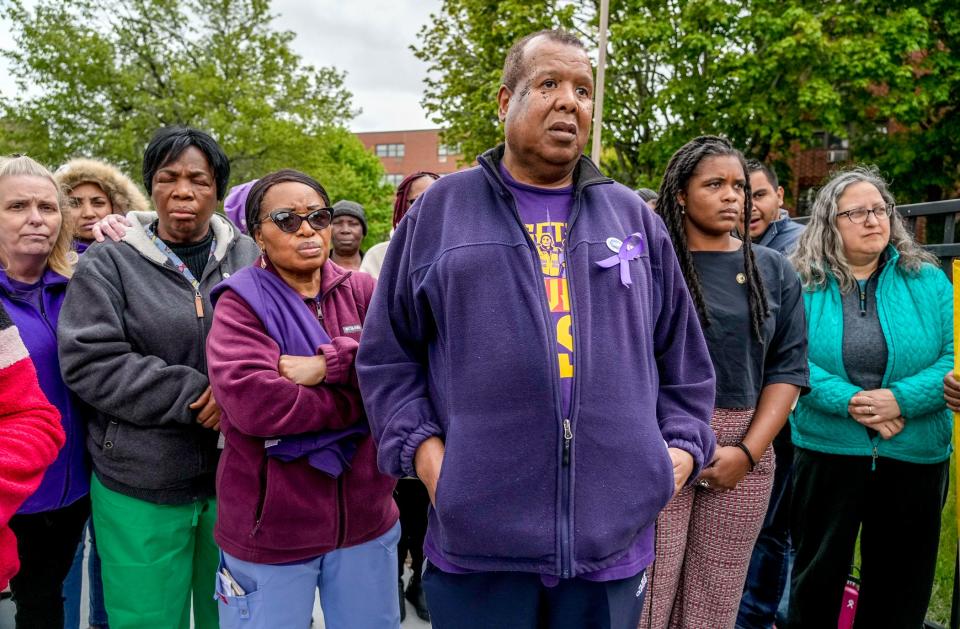RI never enforced nursing home minimum staffing requirements. Why the law might change
PROVIDENCE – The imminent closing of another nursing home has put the spotlight on Rhode Island's highest-in the-nation minimum-staffing mandate, which has become a topic of end-of-session talks between the governor and legislative leaders.
Had the state enforced the minimum staffing mandate, 55 nursing homes would have been hit with $11 million in collective fines, based on the data-analysis conducted by the Rhode Island Department of Health a year ago.
But the enforcement of the law was suspended officially – and then unofficially – amid staffing shortages across the landscape from public schools to restaurants to nursing homes.
Asked the status of the law, Rhode Island Department of Health spokesman Joseph Wendelken told The Journal:
"At this time, the Governor’s team is working with the General Assembly and other stakeholders to assess Rhode Island’s existing minimum staffing requirements and evaluate legislative solutions that support residents, workers, and the long-term health of facilities.
"We have not issued any fines."

How did RI get here?
The push for a minimum-staffing mandate loomed large over the 2020 elections amid an aggressive drive by the Services Employees International Union (SEIU) to oust any state lawmaker unwilling to commit. Then-House Speaker Nicholas Mattiello was one of the casualties.
When Gov. Dan McKee signed the highest-in-the-nation staffing mandate into law a year later, it was greeted with cheers from the union and grim warnings from the industry that the mandate would result in closures.
Advocates of the legislation, though, said it would prevent residents from having to endure long waits for care and boost the wages of currently overstretched staff.
The law initially required at least 3.58 hours of direct care per resident, per day from registered nurses, nursing assistants, physical therapists, and medication aides among others. This minimum was scheduled to increase to 3.81 hours, with enforcement activities commencing on April 1, 2023.
This state law also requires that RIDOH levy monetary penalties for non-compliance on a quarterly basis.
But the Department of Health's Wendelken said: "We ran test data for homes for the second quarter of 2022 to help them understand how they would be affected by the requirements. At that time, 55 homes would have been out of compliance."
The potential fines, had they been levied, would have ranged from $29,642 for Linn Health & Rehabilitation to $1,072,641 for Lakeside Nursing & Rehabilitation.
What happens next?
Neither the governor nor the state's legislative leaders have responded yet to Journal inquiries about the potential resolution of the staffing issues that led John Gage, president & CEO of the Rhode Island Health Care Association, to declare a week ago: "The crisis is here."
"For nearly two years, Rhode Island’s nursing homes have been urging law makers to make meaningful changes to the unfunded minimum staffing mandate currently in effect for RI nursing homes," he said.

"They have been predicting that nursing homes would continue to close, and, unfortunately, that day has come," he said after news broke of the imminent closing of the 160-bed Charlesgate nursing home in Providence. "Five facilities had already closed since the start of the pandemic. Charlesgate is now the sixth."
Davenport Associates, which owns the Charlesgate Nursing Center, cited "severe staffing shortages and shortfalls in state funding to sustain adequate care for its residents."
Quoting the Federal Bureau of Labor Statistics, Gage said: "RI’s nursing facility workforce has decreased by some 20% since the start of the pandemic.
"There is not sufficient reimbursement from Rhode Island Medicaid (the primary payer of nursing facilities) to comply, and there are simply not enough workers available to meet the mandate at this time."
"Without meaningful action by the General Assembly, it is estimated that RI nursing facilities would be fined $60 million in the first full year of enforcement of the mandate ... Without meaningful action, more facility closures are inevitable. Who will care for Rhode Island's frailest elders?"
But there is another side - and a work group that includes lawmakers - attempting to resolve the issue.
The other side: “The Nursing Home Staffing and Quality Care Act was signed by Governor McKee into law in 2021 in order to ensure that nursing home residents receive the care they deserve and caregivers don’t have to live in poverty in exchange for backbreaking labor.
"That's why Raise the Bar on Resident Care coalition is working together with all affected stakeholders to find long term solutions to improve job standards and end the staffing crisis within the framework of the law," the SEIU told The Journal.
This article originally appeared on The Providence Journal: Nursing home staff requirements in RI could change after State House talks

 money
money 